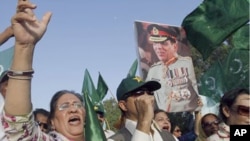The furor over the U.S. raid that killed Osama bin Laden has again spotlighted charges that Pakistan supports militant groups. Many analysts say such support is rooted in Pakistan’s concern about what it sees as growing Indian influence in Afghanistan and in U.S. policy circles.
U.S. officials have said no proof has yet emerged that Pakistan was actively sheltering Osama bin Laden. Nevertheless, the fact that the world’s leading terrorist was discovered in a comfortable compound not far from major military installations has again drawn attention to suspicions that Pakistan has backed Islamist militants as part of its anti-India policies.
At a recent forum, former deputy assistant secretary of defense James Clad said Pakistan’s obsession with India colors all its policy decisions. “I think Pakistan is in business to leverage outside situations, outside power, to their advantage vis-a-vis the existential threat, which doesn’t come from Afghanistan at all, but in the minds of the officer corps, which is preeminent in that country, comes from the east, from the Indians,” he said.
At a U.S. Senate hearing, former National Security Advisor, retired Marine Corps General James Jones, said Pakistan is particularly concerned about growing Indian influence in Afghanistan.
Unfortunately, their concern with India has something to do with Afghanistan. If you’re looking at it a little bit through their eyes you’re a little bit worried, perhaps, that you have India to the east, Afghanistan to the west. And an Indian presence in Afghanistan just incites their fears for the long-term future,” said Jones.
India, which is a growing economic powerhouse, has strengthened diplomatic and economic links to Afghanistan since the fall of the Taliban government in 2001.
U.S. officials have cited links between Pakistan’s powerful and controversial spy agency, the Inter-Services Intelligence directorate, or I.S.I., and the Afghan Taliban, which has used safe haven in Pakistan’s tribal areas as a base from which to attack U.S. and NATO forces in Afghanistan.
Since the 1990s, the I.S.I. has also trained and deployed Islamist militant groups such as Jaish-e-Mohammad and Lashkar-e-Taiba to wage a proxy conflict with India in the Indian portion of the disputed territory of Kashmir. But in 2008, Lashkar-e-Taiba, or L.E.T., mounted a stunning terrorist attack in the heart of the Indian city of Mumbai in which more than 160 people were killed.
The direct role of I.S.I. in the attack remains murky. But a U.S. citizen, David Coleman Headley, had pleaded guilty in a U.S. court to terrorism charges for his role in scouting targets for the attacks. He is preparing to testify against a Chicago businessman charged with helping him, which may shed some light on the I.S.I. role.
Owen Sirrs is a former Defense Intelligence Agency analyst who is writing a history of the I.S.I. He says the U.S. cannot ignore the I.S.I. connection to militant groups.
“You can no longer continue to persist in the notion that, ‘well, I.S.I., it’s a problem that we can eventually work out.’ Because at bottom what we’re dealing with here is a Pakistani fear of India, a Pakistani fear of Afghanistan,” said Sirrs. “There’s a mentality that is locked up into the I.S.I. organization that is something that they’re going to have to work out themselves. But we can no longer just pretend that this is not a problem.”
The bin Laden raid, in which U.S. Special Forces were able to helicopter in and out of Abbottabad without interference from Pakistani forces, was an embarrassment to the Pakistani military, which is focused on protecting Pakistan from India. If the U.S. could cross our border with impunity, officials in Islamabad said, could not India do the same?
Former national security advisor Jones said he sees no sign of any change in Pakistan’s attitude. “It will take political courage, and military support of that political courage, to recognize that there is a better way here with regard to India. But so far, they have been extremely reluctant, and in some cases resistant, to grasping that opportunity,” he said.
Islamabad is not likely to listen to the United States when it comes to India, analysts say. Ties between Washington and Islamabad are frayed, and not just because of charges of I.S.I. support for militants. Pakistan, which receives billions of dollars in U.S. aid, is also concerned about the growing closeness between Washington and New Delhi. To Islamabad’s alarm, the U.S. and India came to a landmark agreement on civil nuclear cooperation - a deal Pakistan would like to have itself. And President Barack Obama last year voiced support for a permanent U.N. Security Council seat for India.
Analysts: Fear of India Drives Pakistani Support for Militants




